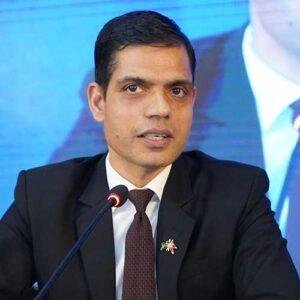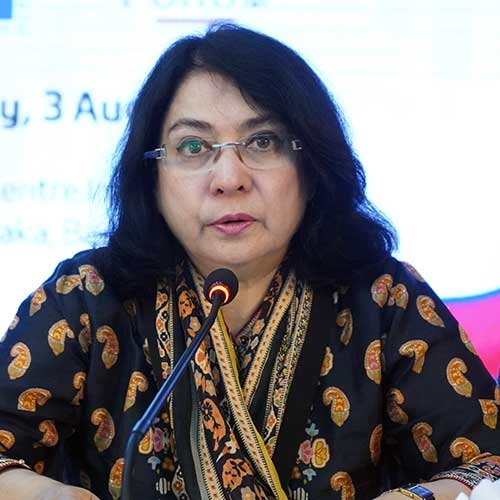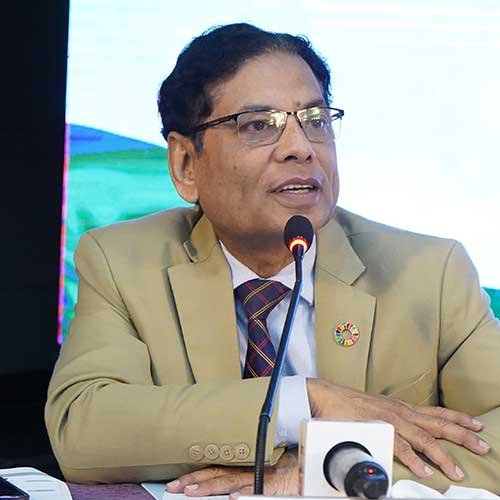
Presentations: Bangladesh | Nepal
Strengthening bilateral ties between Bangladesh and Nepal is more than just a diplomatic necessity—it is key to unlocking the full economic potential of both nations. As both countries look to break through existing barriers, their shared focus on trade facilitation, investment promotion, and enhanced connectivity is essential for fostering long-term prosperity.
A recent roundtable discussion, ‘Bangladesh-Nepal Relations: A Renewed Outlook,’ was held on 3 August 2025, organised by the Centre for Policy Dialogue (CPD) in partnership with the Nepal Economic Forum (NEF). The event brought together stakeholders from both countries to explore actionable solutions to enhance their economic partnership and address the challenges that have hindered progress.

The underutilisation of trade potential was a recurring theme throughout the discussions. H.E. Mr Ghanshyam Bhandari, Ambassador of Nepal to Bangladesh, emphasised the importance of reducing tariffs and addressing non-tariff barriers to unlock the trade potential between the two nations. He noted that while joint ventures have progressed, trade between Bangladesh and Nepal remains limited due to these issues.
Referring to the ongoing negotiations on preferential trade agreement, he expressed hope that they would advance positively. This sentiment was echoed by Dr Syed Muntasir Mamun, Director General at Bangladesh’s Ministry of Foreign Affairs, who stressed the importance of diversification, efficiency, and the adoption of new technologies, especially as Bangladesh prepares for its graduation from Least Developed Country (LDC) status.
‘We must move beyond politics and embrace deeper collaboration,’ he remarked, highlighting the need for economic integration and the challenges ahead.
Mr Md Abdur Razzak, CEO of the Bangladesh Foreign Trade Institute (BFTI), further underscored the untapped potential for cooperation between Bangladesh and Nepal. He called attention to the complementary nature of their economies and their shared geographic advantages, which could be leveraged to build a robust partnership ready for future challenges.
The Executive Director of CPD, Dr Fahmida Khatun, also highlighted the immense economic potential that could be unlocked through targeted efforts to enhance trade, investment, and institutional frameworks. Both nations, she pointed out, are well-positioned to strengthen their economic ties through such collaboration.

In the face of an increasingly disruptive global order, Mr Sujeev Shakya, Chair of NEF, emphasised the need for stronger people-to-people connections. While government-to-government and business-to-business interactions are critical, Mr Shakya argued that fostering robust people-to-people ties is vital to sustaining long-term partnerships between the two countries.
‘People-to-people exchanges will lay the foundation for deeper collaboration in all areas,’ he said.
Ms Afrin Mahbub, Programme Associate at CPD, presented current trends in trade and investment, urging participants to address the structural bottlenecks that hinder long-term collaboration. She emphasised the need to tackle the constraints that hold back the growth potential in both nations, advocating for targeted reforms that would drive sustainable economic development.
The Senior Fellow at NEF, Mr Aman Pant, then shifted the conversation towards Nepal’s priorities in energy trade, logistics, and tourism. He noted that unlocking the potential of the Nepal-Bangladesh corridor requires operational clarity and policy consistency. Mr Pant stressed that a clear and consistent approach would pave the way for enhanced cooperation in these sectors.

The discussion also delved into the challenges both countries face in creating a conducive environment for business and investment. Mr Fahim Ahmed, CEO of Pathao Ltd, shared his experience of navigating the lengthy company registration process in Nepal, which, despite being expedited in recent years, still took six months to complete. He called for further reforms to streamline the business environment, particularly for foreign investors looking to establish operations in Nepal.
Mr Sudip Bhaju, Private Sector Specialist, highlighted the high trade costs that hamper competitiveness in both countries. He urged both nations to collaborate on leveraging their complementary economies and regional alignments to enhance their global market competitiveness.
Energy cooperation was another prominent topic of discussion. Mr Aayush Poudel, Research Officer at SAWTEE, highlighted the growing renewable energy sector in Bangladesh and the potential for Nepal to supply hydropower to meet regional energy needs. Both nations, he noted, could benefit from such collaboration, contributing to the achievement of their respective energy goals and supporting regional development.

Dr Shikha Thapa Magar, Executive Director of NDRI, drew attention to Nepal’s expertise in mountain ecosystems and community-based adaptation strategies. She called for collaborative research on the impacts of climate change in both the Himalayan and Delta regions, with the aim of presenting a unified position at COP summits.
This collaboration, she argued, could position both nations as leaders in climate resilience and adaptation.
Professor Mustafizur Rahman, Distinguished Fellow at CPD, called for a broader economic partnership that goes beyond trade agreements. He highlighted the importance of improving transport, trade, and energy connectivity, which are crucial for strengthening bilateral ties and ensuring long-term cooperation.

The open-floor discussion that followed underscored the importance of improving connectivity between Bangladesh and Nepal, particularly through the operationalisation of the Motor Vehicle Agreement. Participants discussed opportunities in sectors such as hydropower, tourism, and disaster management, urging both countries to adopt a forward-thinking approach to tackle shared challenges.
Financial mechanisms like cross-border digital payment systems and letters of credit in local currencies were also proposed to ease trade between the two countries. These discussions provided valuable insights into the path forward for a stronger, more collaborative partnership between Bangladesh and Nepal, marking a crucial step towards a future where both nations can leverage their full potential for mutual benefit.


